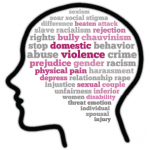- 31% of Asian Americans often worry about being the victims of hate crimes;
- 12% of Asian Americans have been the victim of a hate crime or incident this year; and
- Only 30% would feel comfortable reporting a hate crime to law enforcement.
Racism & Me
One of my friends implied that, as a product of an upper middle class family and good schools, I was obviously not held back by my race. Here’s what she didn’t know: On the playground, kids used to approach me with their hands tugging at the sides of their face to narrow their eyes into slits, with the casual cruelty of children. As I grew older, the stereotypes became more positive. One of my classmates exclaimed that I was smart because I was Chinese, which I’m sure would have come as a shock to my Korean parents.
These experiences are such a cliché, you may not be surprised to hear that they were part of my life as well, having been raised in a predominantly white neighborhood.
You may be more surprised to learn it never really stopped.
In my second year of medical school, the dean of admissions was overheard saying we have enough of them, while gesturing at a list of Asian candidates. In my third year of medical school, I was stopped by the guard at the student housing complex where I had lived for years. I was carrying home dinner, and he assumed that I was delivering takeout for the local Chinese restaurant. As an intern, some of my patients complimented me on my English and asked me where I was really from. As a resident, my attending—himself a white immigrant to the U.S.—asked me how to say medium starch in Korean. As a junior attending myself, I listened to my intern as he detailed to an imaginary audience all of the physical features—and they were legion—the staff could use to differentiate him from the two other male Asian interns with whom he was routinely confused.
More recently, I had an admittedly ill-conceived conversation with a patient about immigration policy. I mentioned that some wanted to deport people who looked like me. She faced me squarely and asked, “Well, are you here legally?”
My friend has never heard me tell these stories. I rarely do. If you are a minority, then you have your own stories. Korean-American novelist R.O. Kwon, for example, tells the story of how she broached the subject of anti-Asian violence with her mother.8 Naturally, her mother turned this into an opportunity to counsel her daughter on being more careful with her own safety. Her advice? Don’t leave your house. “But if you do leave your house,” she added, “speak very loudly, so they know you belong,” as if perfect pronunciation were a shibboleth that would keep her safe.
Through tears, Ms. Kwon tells the rest of her story: “In that statement, there is an admission that my mother knows that she is less safe, because her English is accented.”
NPR reporter Asma Khalid has her own story to tell. She recently took to Twitter to mention that her dad was stopped by a new police officer, who told him, “You don’t look like an American.” He has lived in Indiana for 40 years.9 My dad has lived in New York for 50 years; I can easily imagine someone making the same comment to him.


